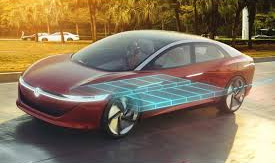In the rapidly evolving landscape of electric vehicles (EVs), a groundbreaking innovation is poised to transform the industry: solid-state batteries. Imagine an EV that charges in minutes, runs for hundreds of miles on a single charge, and boasts a lifespan far beyond current lithium-ion counterparts. As we approach 2024, this isn’t just a dream—it’s becoming a reality. According to a recent report by Bloomberg Green, the global solid-state battery market is expected to grow exponentially, driven by advances in technology and increased demand for longer-range EVs. In this article, we’ll explore how solid-state batteries could revolutionize EV range, the technology behind them, and what this means for the future of sustainable transportation.
The Promise of Solid-State Batteries
What Are Solid-State Batteries?
Solid-state batteries are a type of battery technology that replaces the liquid or gel electrolyte found in traditional lithium-ion batteries with a solid electrolyte. This simple yet profound change offers several advantages:
- Higher Energy Density: Solid-state batteries have a higher energy density, meaning they can store more energy in a smaller space. This translates to increased range for EVs.
- Improved Safety: The solid electrolyte is less prone to leakage and thermal runaway, reducing the risk of fires—a concern highlighted by recent recalls in lithium-ion batteries used in EVs.
- Longer Lifespan: These batteries can endure more charge cycles, potentially doubling the lifespan of current lithium-ion batteries.
Why the Shift to Solid-State?
The shift towards solid-state batteries is driven by the need for better performance and safety. Companies like Toyota, Volkswagen, and Hyundai are heavily investing in this technology, aiming to introduce solid-state batteries to the market by 2024. A report by TechCrunch notes that these advances could see EV ranges extending beyond 500 miles per charge, a milestone that would significantly reduce range anxiety, one of the biggest barriers to widespread EV adoption.
The Impact on Electric Vehicle Range
Extending the Drive
One of the most anticipated benefits of solid-state batteries is the extension of EV range. Current EV models, such as the Tesla Model S and the Lucid Air, boast impressive ranges of up to 400 miles. However, with solid-state technology, these numbers could be pushed even further:
- Increased Range: Solid-state batteries can potentially increase the range of EVs by 50% or more, allowing for more extended travel without the need for frequent recharging stops.
- Faster Charging: With advancements in charging infrastructure, solid-state batteries could support ultra-fast charging, reducing recharge times to just minutes. InsideEVs reports that some prototypes have already demonstrated the ability to achieve an 80% charge in just 10 minutes.
Real-World Applications
The implications of extended EV range are vast:
- Long-Distance Travel: Imagine a cross-country journey without the constant need to plan stops for charging. Solid-state batteries would make long-distance electric travel more convenient and feasible.
- Commercial Use: For fleet operators and delivery services, extended range means more efficient routes and reduced downtime, leading to cost savings and increased productivity.
Practical Considerations and Market Readiness
Challenges Ahead
Despite their promise, solid-state batteries face several challenges before they can become mainstream:
- Production Costs: Currently, solid-state batteries are expensive to produce. As manufacturing processes improve, costs are expected to decrease, making them more accessible.
- Scalability: Scaling production to meet global demand is a significant hurdle. Companies are investing in research and development to overcome these barriers.
How to Prepare for the Transition
For consumers and businesses considering the switch to EVs with solid-state batteries, here are some tips:
- Stay Informed: Follow updates from major automakers and battery technology companies. Brands like Nissan and Ford EV are already testing prototypes.
- Consider Future-Proof Models: When purchasing an EV, look for models that can be easily upgraded to accommodate new battery technologies.
- Plan for Charging Infrastructure: As solid-state batteries become more prevalent, expect improvements in charging infrastructure. Investing in home charging solutions now can prepare you for future advancements.
Conclusion: A New Era for Electric Vehicles
In summary, solid-state batteries are on the brink of revolutionizing the EV industry. With their potential to extend range, enhance safety, and expedite charging, these batteries represent a significant leap forward in sustainable transportation. As we move into 2024, the transition to solid-state technology will likely accelerate, driven by consumer demand and technological advancements.
Are you ready for the future of electric vehicles? Stay ahead by researching the latest developments and considering your next EV purchase with solid-state potential in mind. As the world shifts towards cleaner energy solutions, solid-state batteries will undoubtedly play a pivotal role in driving the EV revolution forward. What are your thoughts on this exciting technology? Share your insights and join the conversation about the future of transportation.

